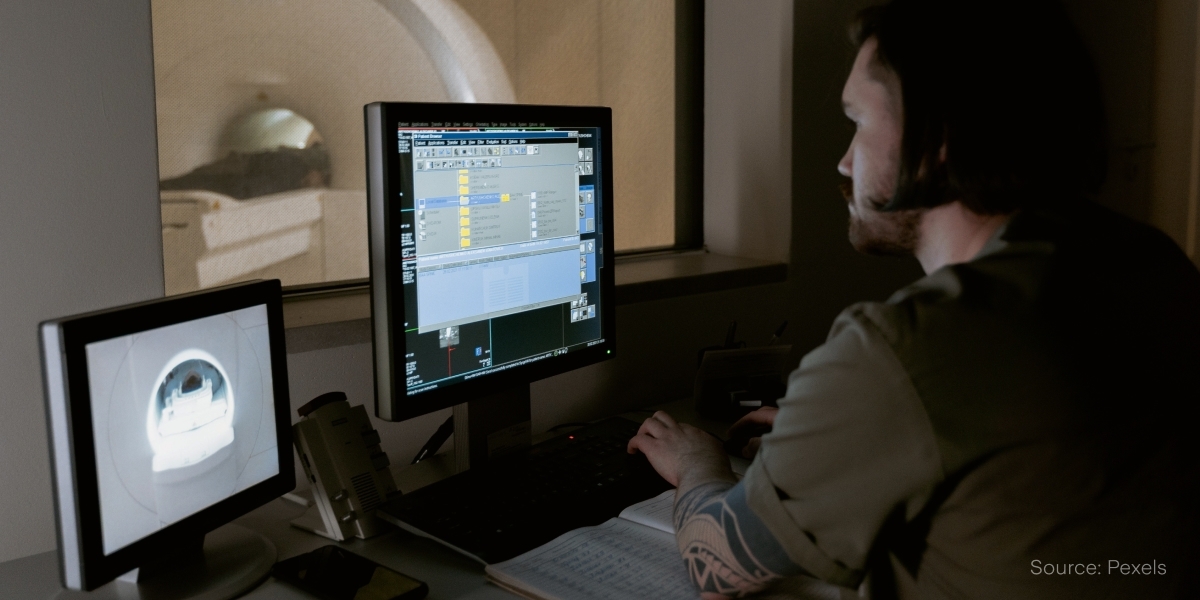
Under the Spotlight AUS: Pro Medicus (PME)
The human body usually gives signals about its condition and medical imaging technology can reveal the situation inside without invasive methods. Helping medical specialists view and analyse these images is the work of firms like Pro Medicus. Let’s put it Under the Spotlight.

Numerous breakthroughs and discoveries have occurred through medical history, shaping the way patients are diagnosed and treated. There are targeted efforts into many areas, but experimentation has also led to considerable success. In 1895, physics professor Wilhelm Roentgen was testing which kinds of substances electromagnetic rays could pass through, when he stumbled upon a new type of radiation. He named them X-rays, with the letter X referring to unknown.
The medical applications of the technology were quickly realised and Roentgen didn’t take out any patents, leading to widespread adoption within only a few years. Investigating and understanding ailments became easier and faster for doctors, who’d previously mainly used invasive methods for serious cases. Over the past century, the medical imaging industry has advanced, with CT and MRI scans producing 3D and 4D visualisations of the body’s interior.
Today, the healthcare and technology industries are deeply intertwined. Medical graduate Sam Hupert was among a number of people who recognised early on the potential of combining elements of both sectors. And forty years ago, together with systems analyst Anthony Hall, he established Pro Medicus ($PME).

System review
The initial focus of the business involved partnering with medical practices and streamlining their operations. Electronic systems could help keep clinical records in order and assist with scheduling. The company later expanded its services to enable patients to get radiology results in shorter time periods. With the use of medical imaging to diagnose diseases and to provide treatment guidance increasing, radiology has remained at the core of the company’s offering.
Pro Medicus’ plans for an ASX listing in 2000 were delayed a few months due to the dotcom bubble bursting. The first overseas contract came in 2002 in the UK and the firm entered North America two years later with a licensing deal with digital imaging company Agfa. Through the partnership, Pro Medicus learned the industry was shifting from film to computer-based reporting. Higher silver prices also made the financials of X-ray film less attractive.
Even though the relationship with Agfa didn’t last, it became clear to the Pro Medicus team that demand for picture archiving and communications systems (PACs) would grow. Improvements in screen resolutions and computing power also opened up new opportunities for PAC systems. After extensive research into merger and acquisition candidates, they came across Visage Imaging in 2009. The approximately $5m purchase played a major role in Pro Medicus’ market cap growth from about $100m in 2009 to more than $5b today.

Health check
The platform Pro Medicus acquired allows specialists to view high-resolution medical images from various electronic devices, including mobile phones and tablets. The processing is completed remotely at a server, then the picture is streamed on the screen. This differs from the traditional method, which compresses and then sends the files. However, firms using this technique, like Siemens ($SIEGY), GE Healthcare Technologies ($GEHC) and Philips ($PHG), still hold the majority of the market share. These businesses initially included software as part of the package when selling hardware to radiologists.
Improvements in scanning and testing technology has come with increasingly large file sizes, which Pro Medicus’ software is well-equipped to handle. Products have also been refined over the years, with particular applications for heart, eyes and breast tissue screenings. Alongside the Visage PAC, the company also offers radiology information systems that can contain patient records, billing and administration systems for doctors. Pro Medicus also drives revenue by charging a premium for its value adding service, which brings convenience and speed for medical specialists.
The company’s main market is private hospitals in the U.S., especially those associated with academia. They tend to be a less price sensitive group, and no other nation spends as much on healthcare. Given the cost of Pro Medicus’ software, it might struggle to sustain its FY2023 profit margin before tax of 67.2% across all clients types. The firm’s success depends on negotiating new contracts and renewing existing ones. Losing a major customer could be detrimental and might signal concerns about its products.

Full diagnosis
The idea that technology could reduce the need for radiologists arrived long before 2023, with AI being renowned for some time as being especially good at recognising patterns in data and automating quantitative assessments. Pro Medicus has received clearance from the U.S. regulator, the Federal Drug Administration, for its Breast Density AI Algorithm and expects further developments to occur in the area. However, it’s seen as more of an add-on for existing services rather than a directly billable item at this stage.
Despite the focus on technical expertise, the company has acknowledged the importance of people. Both founders are in management positions and retain large shareholdings, while many of the original Visage team remain with the business.
Pro Medicus actually advertises its software as a tool to reduce radiologist burnout. Fears about the long-term prospects of the job affects the number of people wanting to enter the speciality, which could lead to the career path evolving away from its current form. The firm will need to be ready to adapt to changes in the market.
While developing software initially comes with high up-front costs, it’s easily scalable to additional customers. Pro Medicus has steered away from acquiring debt over the years and the stock market has rewarded those efforts in recent years. However, there are no guarantees the company can stay ahead of the competition in a relatively specific sector. It will need to be constantly scanning the conditions and hope to quickly identify any pain points.
This does not constitute financial advice nor a recommendation to invest in the securities listed. The information presented is intended to be of a factual nature only. Past performance is not a reliable indicator of future performance. As always, do your own research and consider seeking financial, legal and taxation advice before investing.

Megan is a markets analyst at Stake, with 7 years of experience in the world of investing and a Master’s degree in Business and Economics from The University of Sydney Business School. Megan has extensive knowledge of the UK markets, working as an analyst at ARCH Emerging Markets - a UK investment advisory platform focused on private equity. Previously she also worked as an analyst at Australian robo advisor Stockspot, where she researched ASX listed equities and helped construct the company's portfolios.
.jpg&w=3840&q=100)
